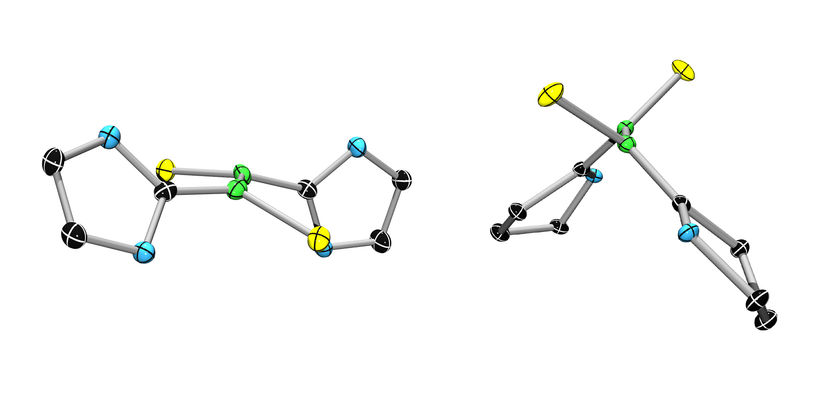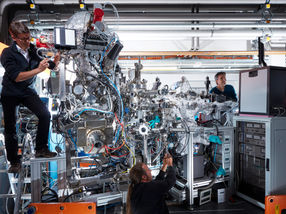Stable biradicals adding a new attraction to chemistry
Boron biradical in ground-state synthesized
Advertisement
Researchers at the University of Würzburg in Germany have succeeded in twisting molecules so much that their double bonds have been completely destroyed. The result: unusually stable biradicals.

A conventional boron-boron double bond (left) and its extremely stable biradical relative.
Dr. Rian Dewhurst
Boron has a range of uses throughout everyday life, from laundry bleaches to heat-proof glass and ceramics. Chemists at Julius-Maximilians-Universität Würzburg (JMU) in Bavaria, Germany, have a particular interest in the chemistry this element, and have been researching the fundamental properties of boron for years. These researchers have now succeeded in twisting molecules with multiple bonds between boron atoms, leading to unusually stable biradicals.
Biradicals are usually highly reactive molecules. They are generated in energetic processes such as combustion and are normally so short-lived that they are unable to be isolated or studied by traditional methods of chemical analysis.
The new biradicals prepared at the JMU are dramatically different, however: they are solid compounds and were found to be stable for weeks. "We now have model compounds in hand that we can study without having to rush", explains Prof. Holger Braunschweig from the Institute for Inorganic Chemistry.
Twisting of boron-boron double bonds
For a long time, chemists have attempted to twist, distort and rupture double bonds between atoms – with only limited success. The JMU team has now made the dream of twisting a double bond by a full 90 degrees a reality.
The Würzburg researchers had originally expected to obtain diborenes from their reactions: the products should have had double bonds between their boron atoms, as would normally be the case. Instead, they obtained molecules where the double bond between the atoms was twisted by 90 degrees and thereby completely broken.
Biradicals in their electronic ground state
The result of the experiments was the synthesis of unusually stable biradicals. This is highly unusual: "When a molecule is twisted against its will, it usually becomes less stable, and also more reactive", explains Julian Böhnke, doctoral student at the JMU and first author of the publication in Nature Communications. "The stability of the molecules is due to them being biradicals in their electronic ground state, despite their two unpaired electrons", says Braunschweig. "This structure was completely unexpected."
Applications of the molecules are still far away, according to Prof. Braunschweig. If they could be installed into a polymeric material, their use in organic electronics could become a possibility. However, Braunschweig emphasises that "this is still a long way off". The next step for the JMU chemists is to test whether similarly stable biradicals can be prepared with double bonds between boron and carbon.
A success story of Research Training Group 2112
The study of the biradicals was particularly extensive and complex, involving sixteen researchers and three years of research. The main part of Julian Böhnke's doctoral thesis will be based on the topic. Böhnke is part of the Research Training Group (Graduiertenkolleg) 2112 (Molecular Biradicals: Structure, Properties and Reactivity), a research consortium headed by Prof. Ingo Fischer. The Research Training Group allows doctoral students to investigate the physical and chemical properties of biradicals in an interdisciplinary team.
Critical to the success of the study was the efficient collaboration with expert theoretical chemistry groups. Work by the teams of Profs. Bernd Engels and Roland Mitrić was essential in obtaining a thorough understanding of the bonding situations in the newly-prepared biradicals. Two other German research groups from Göttingen and Mülheim an der Ruhr were also integral parts of the team.
The work was financially supported as part of the Research Training Group 2112 funded by the German Research Foundation (DFG). Further support came from Prof. Braunschweig's Advanced Grant from the European Research Council.





























































